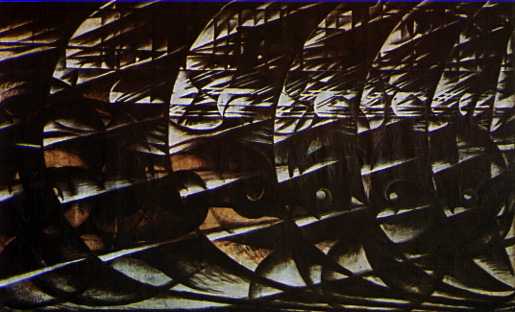

Introduction: 1909
Futurism's earliest moments, as reported by F.T. Marinetti, reverberate
with noise and speed. "Suddenly," writes the artist and propagandist
in the first of a stream of manifestos, "we jumped, hearing the mighty
noise of the huge double-decker trams that rumbled by outside"1.
Noise startles these self-described "proud beacons" of Futurist
thinking into an awareness not of the early morning hours but of the mechanical
sounds which echo across the recently industrialized streets of Milan. By
contrast, the rest of the city is reduced to silent immobility -- "the
old canal muttering its feeble prayers and the creaking bones of sickly
palaces above their damp green beards." Surrounded by empty air, Marinetti
and his colleagues yearn for the "famished roar of automobiles"
or the noise of factories at full throttle. Machines capture their hearts,
filling them with a "raging broom of madness" which "drove
us through streets" in search of lamplights, engines, and "Death"
(M 48).
In many ways, Futurism was neither a movement nor particularly artistic;
it was, rather, an exercise in propaganda intent upon redefining the human
psyche for a modern, technological world. Lifting much of their philosophy
from Nietzsche and Bergson, rejecting Freud and psychology, creating art
from newspaper headlines and rumors, performing in streets and bars instead
of theaters, the early Futurists simultaneously entertained and terrorized
the general public, instilling into Italian culture a resolute fascination
with technology, power, and (above all) war. "We will glorify war --
the world's only hygiene, " Marinetti writes, "militarism, patriotism,
the destructive gesture of freedom-bringers, beautiful ideas worth dying
for, and scorn for women" (M 50). Marinetti and his followers
were performance artists, flaunting antagonistic, intolerant, and aggressive
rhetoric upon angry, divisive audiences. They mocked, ridiculed, and debased
Western culture's heritage and, in the process, foreshadowed many of the
struggles that would dominate the century to come.
Any examination of Futurism's contribution to the artistic and political
dialogue of pre-war Europe inevitably recites the movement's proto-fascist
ideology and Marinetti's role in Mussolini's government. While these issues
are certainly significant and cannot be ignored, I would suggest that Futurism's
role in the historical and political development of the 20th century does
not end with Mussolini's death in 1945, but rather continues up to the present.
In fact, I would argue that it is only in our present, digital age, that
Futurism's legacy can be fully understood, for it is here that fascism's
technological shaping of bodies and ideologies is most apparent. As Arthur
Kroker and Michael Weinstein would remark some 85 years after Marinetti's
first manifesto, "Humanity, and all of its formation have crashed;
anti-humanism is a fact, a condition, not a position. Something better
than the flesh has seduced and intimidated it, the technological imaginary
-- virtual reality" 2 This chapter
will examine the earliest developments of this "virtual reality,"
as it was defined by Italian Futurism in the first decades of the 20th century.
I will begin with an analysis of Futurism's "break" with the past
in favor of a mechanized and dynamic future, fueled by a recognition of
"humanity" as a changed concept. I will then focus upon Marinetti's
notion of "parole in libertà" or "words-in-freedom,"
which sought to "destroy the I in literature" by subsuming
"human" discourse within bursts of words (M 95). Through
this, language is transformed into an ethereal process reminiscient of both
radio signals and "spiritualist séances" (M 99).
Finally, I will examine Luigi Russolo's The Art of Noises, which
redefined the bourgeois conceptions of "humanity" and "art"
by eliminating the distinctions between sound, music, and noise. To Russolo,
the central struggles of modern life would be fought not with the eyes but
with the ears; consequently, the control of aural perception would be a
crucial factor in the ideological and political struggles of the 20th century.
 WebGlimpse |
|
| Search: The neighborhood of this page The full archive | |